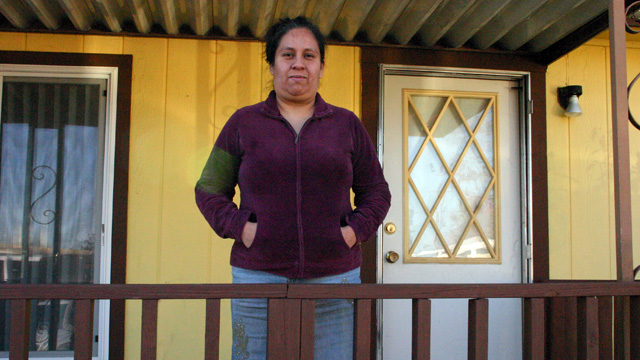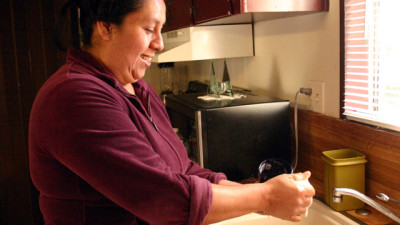Farmworker's Sexual Harassment Claim Leads to Trial, But Odds Are Long in Criminal Cases

Farmworker's Sexual Harassment Claim Leads to Trial, But Odds Are Long in Criminal Cases
For Guadalupe Chavez, it all started with a missing paycheck back in 2006.
She was supposed to earn $245 for a week of picking pomegranates -- money the widowed mother of two needed to pay her bills. When she went to track down the check, a supervisor she'd never met before told her someone had it out in the fields. He told her to follow him there in her truck.
“So I followed him,” says Chavez in Spanish, recounting what happened next. “I followed him to parts of the field I didn’t recognize. It’s so easy to get lost out there.”
She says he stopped in an isolated pistachio orchard, got out of his truck, approached her vehicle and demanded her underpants in exchange for her paycheck.
“He said … ‘I’m the supervisor, I’m in charge here,’ ” says Chavez. “And I remembered that he had told me that he had a gun in the truck. And so when he said that, and he banged hard on the car with his hand, I thought, ‘He’s serious. If I don’t do what he says, he can kill me.’ ”
Then, Chavez says, the supervisor reached through her window and raped her with his fingers.
“He was hurting me,” she says. “Imagine, his fingers were all dirty with pesticides. I wanted him to stop and hoped that was all he wanted. I thought, ‘If he kills me, who will take care of my children?’ “
After those long, frightening moments, he finally gave her the check. But then, she says, he demanded oral sex before letting her go.
“All I remember,” Chavez says, “is that I drove out of there really fast, too fast, because I wanted to get away.”
Two days later, Chavez went to a rural legal aid office in Fresno about another missing check. Lawyers there said she seemed distraught, and they gently encouraged her in Spanish to tell them what was wrong. Finally, she broke into tears and described the rape. The attorneys urged her to go to the hospital, and she gave them the OK to call the police.
“Absolutely, I believed her. Her story was consistent. It didn’t bounce from all over the place to all over the place,” says Kris Zuniga, then an officer with the Kings County Sheriff’s Department who investigated Chavez’s case.
Zuniga is now a sergeant with the police department in Avenal, a rural town southwest of Fresno. As a former farmworker himself, he says he understands why more undocumented women like Chavez don’t call the police:
“For one, they’re afraid they’re going to get deported,” Zuniga says. “Number two, word gets around to the other bosses in the valley that are also doing farm labor work. They’re going to say, ‘Don’t hire that person, don’t let them have a job because they’re going to report something if something happens.’ “They’ll never work out there again.”
“I’m sure it happens more than you probably know or obviously than it is reported,” Zuniga says. “My guess is the guys that are out there doing this, it’s not their first rodeo. They know exactly what they’re doing. They have the hammer over them. They have the power. They can give them a job and they can give them a check.”
Zuniga also points out that most farmworker women don’t get a rape exam if they’re assaulted.
“And a week goes by,” he says, “two weeks goes by, three weeks goes by. You’ve lost that physical evidence, so now you’re down to a ‘he said, she said.’ And those are tough -- tough to prosecute.
The first stop for a victim often isn’t the police station. It’s more likely a place like Westside Family Preservation Services, a small domestic violence agency tucked into a run-down strip mall in the tiny farmworker town of Huron.
On a typical day, women constantly stream in from the fields after work, pulling down the brightly colored bandannas that protect their faces.

Caseworker Amparo Yebra says sometimes the women will confide to her about sexual harassment or violence in the fields.
“It takes time. They have to feel comfortable,” Yebra says. “They have to feel like they can trust that they’re going to be helped.”
Yebra says she literally holds a woman’s hand and walks with her into the police station to file a report.
But sometimes victims change their minds once they find out what’s involved in a criminal case.
“That’s because of all the questions that they have to go over and over and over about your story,” Yebra explains. “Then they send her to another person. And then she has to again talk about the story. Now she has to go to court and again testify to the story. That’s very painful.”
Sandra Mendoza agrees. She’s the Mexican government’s consul for protection of Mexican citizens in the Central Valley, and she helps crime victims navigate the U.S. justice system.
She says sometimes victims of sexual harassment in the fields prefer to come to confidential settlements with farm companies rather than face a jury trial.
“It really depends on how far the victim wants to go,” she says. “You could take it to the court, send the perpetrator to jail, and set an example so that other supervisors think twice before doing this kind of thing. But a lot of times the victim wants to just wrap things up as fast as possible. And coming to an agreement with the company may do that: it’s confidential, no one else finds out about it from either the victim’s or the company’s point of view.”
Even when women do pursue a criminal case, the odds are long. District attorneys have to decide there’s enough evidence to prosecute -- and prove the case beyond a reasonable doubt.
Kathy Ciuffini, assistant district attorney for Kings County, says it’s often a matter of ‘he said, she said.’ “If the defense is, ‘she consented,’ those cases are very, very difficult,” says Ciuffini, “because it’s a credibility match, basically.”
In the case of Guadalupe Chavez, Ciuffini decided there was strong enough evidence to prosecute. At the time, Ciuffini was the county’s sexual assault prosecutor. But this was her first farmworker case. And she says the language barrier can be a big hurdle for the jury.
“If they’re hearing the victim’s story in their own language,” he says, “I think it’s easier for them to understand. If they’re hearing it through an interpreter, jurors can’t make that connection with the victim.”
It’s hard to say whether that played a role in the outcome of Guadalupe Chavez’s case. The man she accused admitted sexual contact, but argued it was consensual. And the jury acquitted him.
But even so, Chavez says she feels like she got some justice – because the man she accused of raping her had to face her in court.
“It was worth it,” she says. “And I would do it again. Because at least now (the alleged perpetrator) might think twice about doing this to somebody else.”
Chavez was eventually able to qualify for a special “U visa” for crime victims, which has allowed her to gain legal status.
This series was reported in collaboration with Bernice Yeung of the Center for Investigative Reporting and the UC Berkeley Investigative Reporting Program. It's part of a larger project with Frontline and Univision.
More: Frontline
More: Center for Investigative Reporting
More: Down On The Farm, Sexual Harassment Claims Finally Surface (From the TCR Archive)
